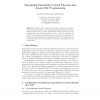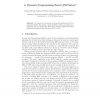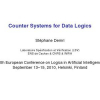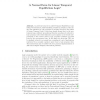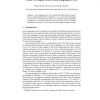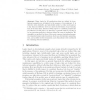JELIA
2010
Springer
13 years 6 months ago
2010
Springer
Abstract. Nonmonotonic causal logic became a basis for the semantics of several expressive action languages. Norman McCain and Paolo Ferraris showed how to embed propositional caus...
JELIA
2010
Springer
13 years 6 months ago
2010
Springer
Abstract. We present a novel system for propositional Answer-Set Programming (ASP). This system, called dynASP, is based on dynamic programming and thus significantly differs fro...
JELIA
2010
Springer
13 years 6 months ago
2010
Springer
JELIA
2010
Springer
13 years 6 months ago
2010
Springer
In previous work, the so-called Temporal Equilibrium Logic (TEL) was introduced. This formalism provides an extension of the Answer Set semantics for logic programs to arbirary the...
JELIA
2010
Springer
13 years 6 months ago
2010
Springer
JELIA
2010
Springer
13 years 6 months ago
2010
Springer
Action languages allow for compactly describing dynamic domains. They are usually implemented by compilation, e.g., to Answer Set Programming. To this end, we developed a tool, cal...
JELIA
2010
Springer
13 years 6 months ago
2010
Springer
In this paper, we show that Reiter’s default logic in the propositional case can be translated into answer set programming by identifying the internal relationships among formula...
JELIA
2010
Springer
13 years 6 months ago
2010
Springer
Abstract. Many logics for AI applications that are defined by denotational semantics are trivialized in the presence of inconsistency. It is therefore often desirable, and practic...
JELIA
2010
Springer
13 years 6 months ago
2010
Springer
Multi-Context Systems (MCS) are formalisms that enable the interlinkage of single knowledge bases, called contexts, via bridge rules. Recently, the evaluation of heterogeneous, no...
JELIA
2010
Springer
13 years 6 months ago
2010
Springer
Abstract. Tabled evaluation is a recognized and powerful implementation technique that overcomes some limitations of traditional Prolog systems in dealing with recursion and redund...
